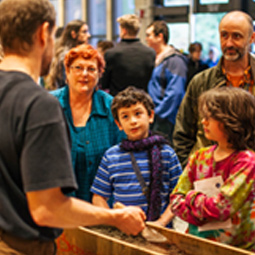Frequently Asked Questions
Can I get credit for attending the DIG Field School?
Yes! We are currently approved to offer continuing education clock hours from the Washington State Office of Public Instruction (30 hours), professional development renewal units from the Montana State Office of Public Instruction (40 units), and the University of Washington Continuum College. We are also happy to work with teachers from other states on getting approval for appropriate continuing education credits. Teachers are not required to apply for credits; teachers are responsible for any fees associated with their credits.
How much does it cost to participate in the DIG Field School?
There is a $250 course fee to participate in DIG Field School Hell Creek.
The course fee covers partial administrative costs for the program. Food, lodging, scientific equipment and ground transportation onsite are provided. This fee does not cover personal camping equipment (tent, sleeping bag, clothing, etc.) or fees associated with education credits (for example, if you want to receive credit through the University of Washington for attending, you will need to pay those fees yourself).
We also currently aren’t able to directly pay for travel costs (e.g., plane tickets, car transportation, etc.), although we do provide transportation from the Billings International Airport to the Hell Creek Recreation Area and back.
We do have limited financial assistance available to cover the registration fee (up to $250) and as well as travel stipends (up to $500) to participants who need financial assistance to attend our field school.
If you have any additional questions, please send us an email.
Who can apply for the DIG?
We welcome applications from K–12 teachers in the US and across the globe! As of 2023, we’ve served teachers from 39 different states and are growing every year!
Where does the DIG Field School take place?
The DIG Field School Hell Creek takes place in the Hell Creek Recreation Area 26 miles north of Jordan, Montana.
The DIG Field School Petrified Forest takes place at Petrified Forest National Park in northeastern Arizona and includes a day excursion to Grand Canyon National Park.
Both DIG sites are famous for their preservation of fossils of dinosaurs and other organisms, and are a hub for scientific researchers around the world. During the DIG, instructors and participants eat, work, and tent camp together, providing an authentic and impactful experience.
Please note that DIG Field School Petrified Forest will not be offered in 2025 but we hope to resume this program in summer 2026.
I'm not a teacher — can I still get involved?
Absolutely! You can read about volunteer opportunities at the Burke Museum, or email us if you have any questions. You can also subscribe to our newsletter for updates on our program and current events in the scientific event. Interested in supporting the DIG? You can donate to our program here.
Have a question?
Contact digfs@uw.edu.

Support the DIG Field School
Your support makes it possible for DIG to provide field school experiences, classroom visits, lab materials, curriculum, and more.
